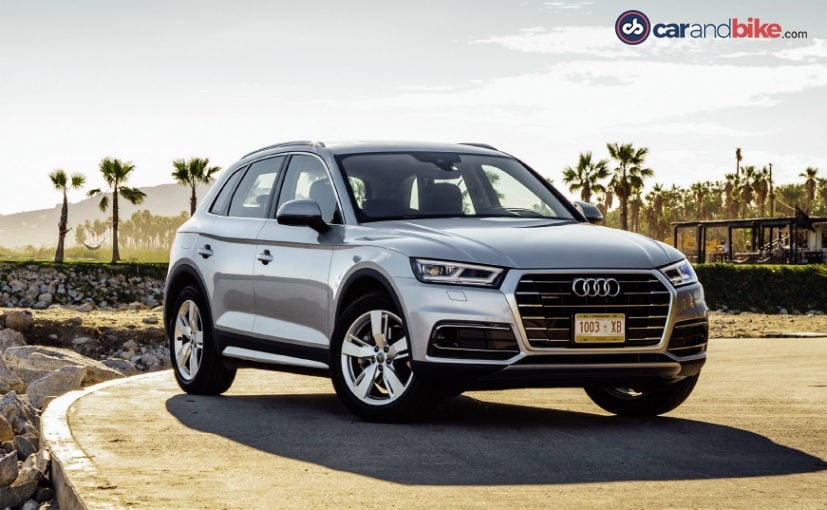
The new generation of the Audi Q5 is a comprehensively improved vehicle. Not that the last car had glaring flaws – after all it has been a hit since its 2008 launch. But yes 8 years really called for a new model. And so 1.6 million units later the next generation car is ready to roll. The new Q5 has many changes and firsts on it, but one most significant to the start the story with, is that it’s being built outside Germany. It is the first time a major Audi model is being made completely outside Germany or even Europe for that matter! It is rolling out of the brand new facility that opened doors this August in San José Chiapas, in Puebla, Mexico. The plant has a 150,000 units annual capacity for now, though given the success of the last Q5 I’m quite sure Audi would need to ramp that up, or begin producing the car elsewhere too – to make good on expected demand. And so I am in Los Cabos, Mexico to drive it too! Los Cabos is on the Baja California peninsula and not close to the plant though! I have to say for me the fact that this drive was in Mexico was a double treat – it was my first visit to the country, and its roads are very much like India’s! So it gave me a great impression of the car in terms of how it would do back home.
Alright that done let’s talk about the new car. When it was first shown publicly at the Paris Motor Show in September this year it got stick for its looks, like the new A4 did last year! Once again it seemed that Audi had erred – by going evolutionary rather than revolutionary on the design front. It’s a bit more obvious in the case of the Q5 though – that this is a new gen. The face looks very much like this is the sibling of the new 2nd generation Q7. The new matrix-LED optional headlamp cluster is attractive and so is the new thick-edged trapezoidal grille that is nicely finished in matte polished metal and black. The S-line styling kit adds a few more chrome inserts to the bumper though my first test car was not S-line! Overall the new Q5 is attractive, has good presence and instantly comes across as very well built. The taillight signature is now very distinct and looks very sharp – with a Q-like dip-down element.
 (2017 Audi Q5-Rear)
(2017 Audi Q5-Rear)
My test car was the 2.0 TDI quattro-ultra with 190 horses as its output – and with 400 Nm of peak torque. The same unit also offers another version with 163 bhp that is slightly more fuel-efficient. I suspect that is what Audi will choose for the Q5 when it gets to India, but sadly that wasn’t on offer to test. We also did have the 252 bhp, 2.0 TFSI quattro-ultra petrol and the 3.0 TDI Quattro with 286 bhp. But you may have noticed that I mentioned quattro-ultra on the 4-cylinder engines and just Quattro on the 6-cylinder engine. That’s because they are indeed different. The new Q5 isn’t the first model to receive Audi’s new ‘ultra’ system. Is it different to what the four-ringed brand has built its name on all these years you ask? Very different – since this is not really the 60:40 rear/front all-wheel-drive but instead a front wheel drive that can also send power to the rear wheels. So there’s no centre differential. Audi says the system performs just as well as the classic Quattro by using electronic sensors to constantly monitor traction and surface conditions. There are two clutches operated by computer control that send torque to the rear – one is inside the rear differential and the other sits at the end of the transmission. This helps weight loss and also cuts unnecessary friction says Audi. The electronic controller monitors a sensor that chooses when to engage the clutches. It is only then that all-wheel drive kicks in. But to have to say I’m a little disappointed that the classic Quattro is only optional and that too – only on the 3.0 TDI.

(2017 Audi Q5-Quattro)
But that said the quattro-ultra does work well. Its been seen on a few other models already like I said and like in those cars, it responds quickly and effectively. You get a good sense of traction and stability for sure, but its always need based, and so will not give you the sense of balance and ride that the classic Quattro gives you. If it helps keep costs lower and make Quattro standard across certain car lines then so be it I suppose. I am not one to shun the new simply so I can wear the purist badge, and on the Q5 I think we are okay with the switch. Of course I sang a different tune when I DID try the classic Quattro on the 3.0 TDI, because fickle is the human mind – yes that is my defence!
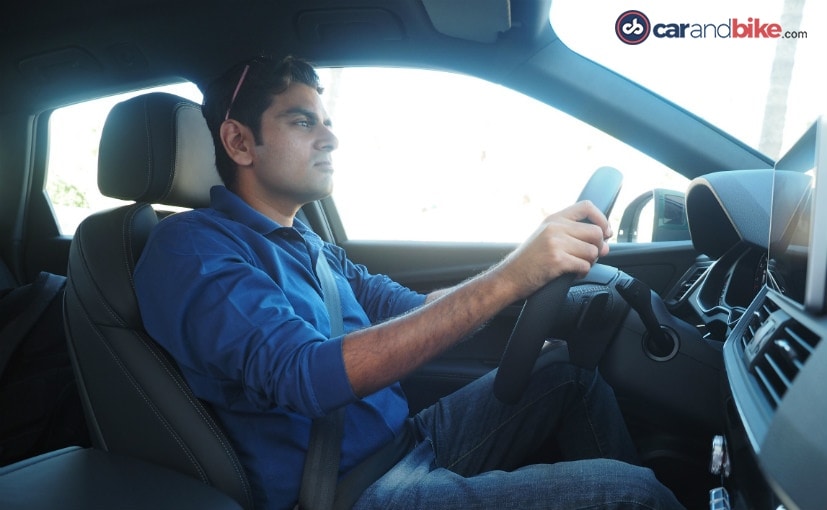 (2017 Audi Q5)
(2017 Audi Q5)
Jokes aside, where the new Q5 definitely scores is improved handling and a superb ride quality. The suspension setup and chassis control give you a tremendously comfortable yet dynamic car. I did find that the changes on the drive select are not as obvious as on the previous car – but that comes back to the very strong body integrity the car has anyway. This is because the new Q5 carries over pretty much nothing from the old one that was built on the VW Group’s MLB platform. The car is now almost 100 kilograms lighter than the old Q5. Aluminium goes into making the hood, bumper beams, brake callipers and boosters, steering column housing and suspension members – all bringing down the weight.
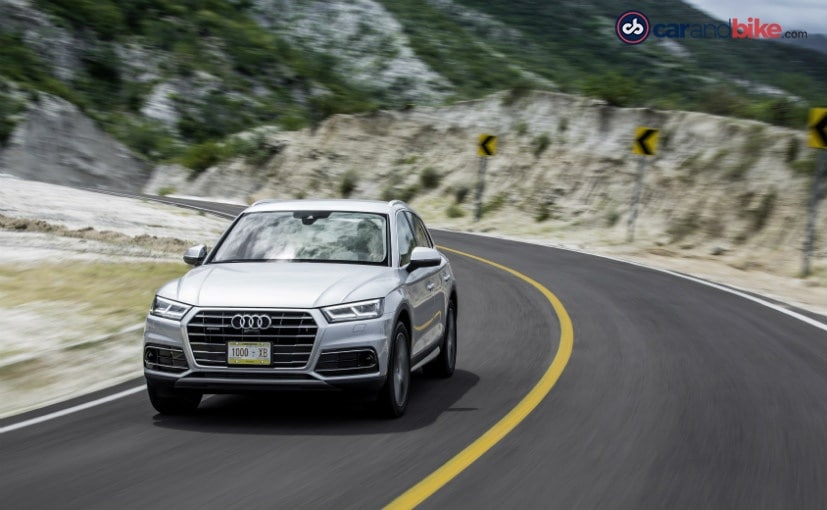 (2017 Audi Q5- In action)
(2017 Audi Q5- In action)
That said the new Q5 is definitely stiffer than its predecessor. But it has variable dampers that help swallow up any uneven or broken surfaces and bumps; and also controls roll effectively. The Continuous Damping Control system has been further enhanced and tuned by Audi engineers, though the supplier is ZF. Our test cars were also equipped with the optional air suspension – which adds to the superfluous ride quality. This also gives you the option to lower the car for easy cargo loading or raise it by 45 mm for off-roading. It is still too early to know if Audi will bring this option to India, though drive select and Continuous Damping Control are indeed likely to be standard.
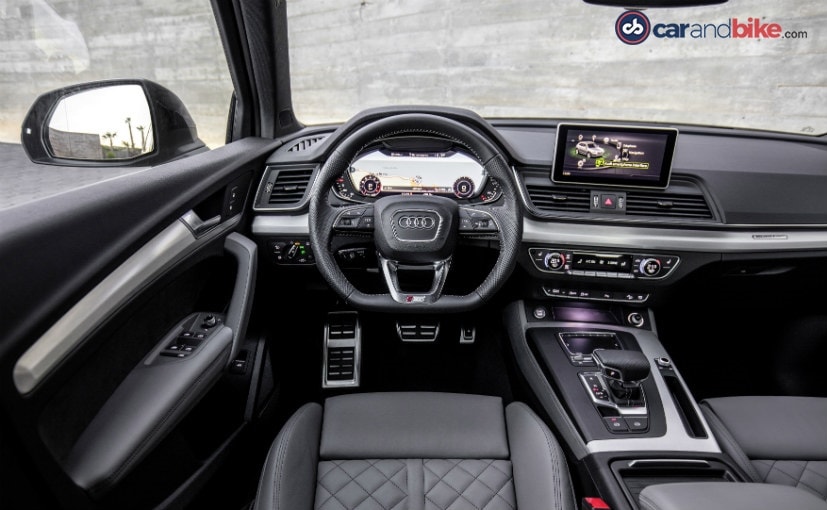
(2017 Audi Q5-Dashboard)
Also expected to be standard will be the optional Audi virtual cockpit – or the 12.3″ digital instrument cluster interface. We now know this from the TT, R8, Q7 and A4, and is no doubt a big selling point for Audi – even so in India. The virtual cockpit can now be provided software upgrades at the dealer – so the car is more future proof too. The cabin is roomy and the back seat in particular is very comfortable. The actual dimensions have increased only marginally but the sense of comfort and space is much enhanced. The updated MMI (Multi Media Interface) system comes with a touchpad to be able to write in destinations or instructions – still just one letter at a time though! The navigation system on the car incorporates Google Earth. The MMI also provides smartphone connectivity of course, and can accommodate an LTE sim, turn into a Wi-Fi hotspot and let you make video calls in full HD! The optional Bang & Olufsen 3D sound system kept me entertained as well – playing what else – but the Eagles and Hotel California quite often.

(Hotel California-which served as inspiration to ‘The Eagles’)
You see Audi had preloaded this music into the car’s jukebox – since the Baja California peninsula is home to THE Hotel California in the small town of Todos Santos that inspired the song. Or so we were told – when we stopped there for lunch. As I tweeted we could check out and actually leave – which was a relief!
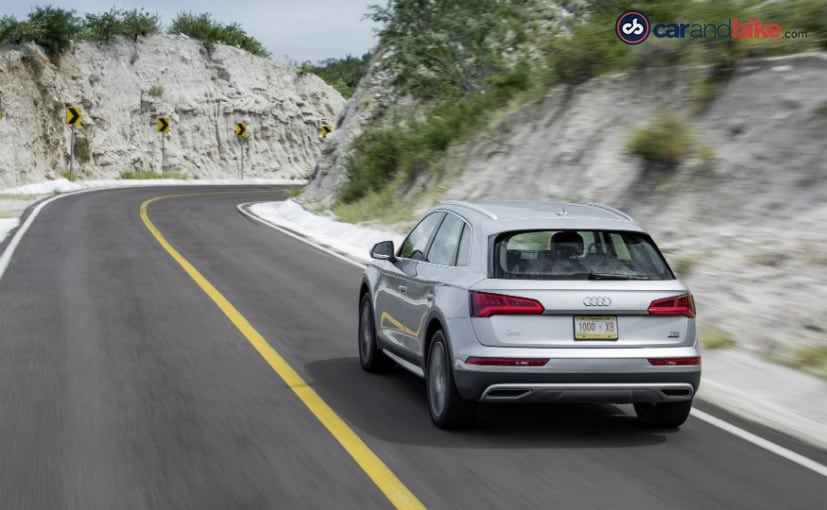
(2017 Audi Q5- In action)
The car comes with all kinds of driver assistance features – adaptive cruise control, active lane assist (that works at up to 65 kmph and keeps the car autonomously in its lane), collision avoidance assist, pre-sense front and rear, park assist, blind spot warning, distance indicator, high-beam assist, and yes – the much touted matrix LED lights. If that wasn’t enough it offers Predictive Efficiency Assist – a new feature that can tie into the navigation and adapt speed in line with traffic data!
Having spent two days with the new Q5 I can tell you that the car is better than before, and I say that with conviction. The only problem is that it will take quite long to get to us. Europe gets the car starting January. That’s followed by the US debut, and it is only in the second half of next year that the right-hand-drive markets will begin to get the car. It will likely be assembled in India – which means we will have to wait for kits to be made available too – something the San José Chiapas plant is currently not doing. So yes – get ready for a long wait. That’s the bad news. The good news? It will be well worth it!
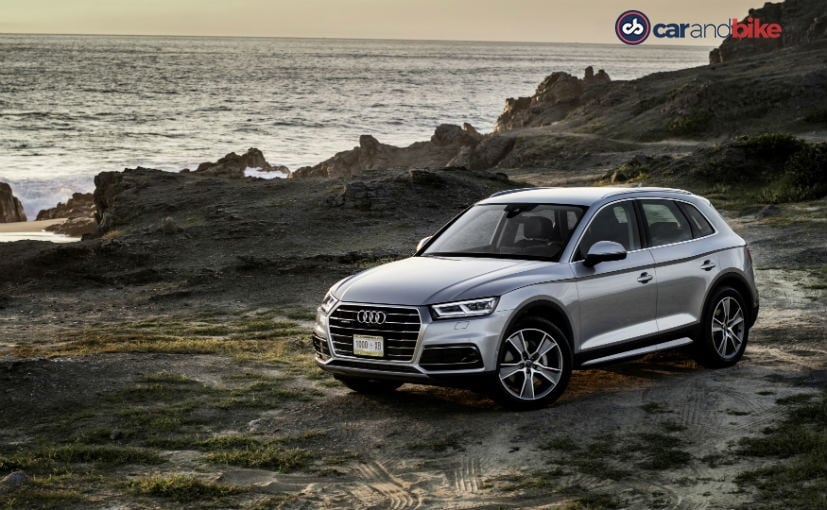
(2017 Audi Q5)
